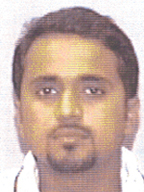“The government intends to offer evidence at trial demonstrating that the defendants attempted to secure the financial and operational support of various terrorist individuals, including Adnan Shukrijumah, an Al-Qaeda operative from the Caribbean region, and various terrorist organisations, including the [Jaamaat-al-Muslimeen],” prosecutor Benton Campbell wrote in a recent pleading submitted to New York Court Judge Dora Irizarry, who is hearing the case.
According to the Federal Bureau of Investigation (FBI) website, El Shukrijumah speaks English and carries a Guyanese passport, but may attempt to enter the United States with a Saudi, Canadian, or Trinidadian passport. The website said the man is wanted in connection with possible terrorist threats against the United States and a US$5M award is up for grabs for information leading directly to the capture of him.
Former Guyanese parliamentarian, Abdul Kadir; former JFK worker Russell DeFreitas, a Guyanese-born US citizen; Kareem Ibrahim, an imam from Trinidad; Guyanese Abdel Nur have been charged with conspiring to blow up JFK airport, tanks storing aviation fuel and underground fuel pipelines.
Campbell’s disclosure of the Al-Qaeda link was part of a reply to the opposition by DeFreitas to the prosecution’s request for an anonymous jury for the trial. According to Campbell, in furtherance of their efforts to gain the support of the Jaamaat-al-Muslimeen for their plan, defendant Abdel Nur, who by his own admission had a prior relationship with the group’s leader Abu Baker, had travelled to Trinidad to meet with him and discuss the plot. “Ultimately, at the suggestion of defendant Ibrahim, the defendants decided not to work with [the group] but instead to pitch their idea to other individuals and organisations associated with Iran. The defendants were arrested before they could pursue this new strategy,” Campbell wrote.

He said whether Bakr would have been interested further in the defendants’ plan has no bearing on the guilt of the four. In his motion to seeking an anonymous jury, Campbell had said that the defendants’ association with the Trinidadian militant group also raised concerns about juror safety and the integrity of the judicial process. “JAM has a long history of violence,” he noted.
He had gone on to detail the activities of the organisation and its leader Abu Bakr, who is said to have links with Libyan leader Mohamar Qadafi and other Islamic militant organisations. Campbell had said that the organisation is “notorious for witness tampering and otherwise obstructing the judicial process.”
In his motion, DeFreitas, who was joined by his three other co-defendants, had requested an evidentiary hearing to address disputed “factual allegations” in the government’s motion. He contended that an anonymous jury is unnecessary because the defendants did not have the ability to tamper with the jury.
However, Campbell argues that three factors need to be taken into consideration when looking at the issue of anonymous jury: the seriousness of the charges against the defendants; the potential threat of corruption of the judicial process; and the expectation of potential publicity. He said the jurors would have reasonable concerns for their safety given, the serious and violent nature of the defendants’ alleged plot to kill innocent civilians and cause massive economic damage to the US by conducting a large-scale terrorist attack on JFK Airport and the defendants’ association with a militant organisation in Trinidad that tried to overthrow the government and has killed dozens of people.
In his first motion, Campbell had singled out Kadir, and described the former PNC parliamentarian as someone who had “connections with militants in Iran and Venezuela” and who was shown the footage of the airport and expressed interest in furthering the plot but “needed a few weeks to contact some associates who would probably help them.
The four were arrested following information provided to the US authorities by a confidential source, who is a convicted drug trafficker and who is receiving financial assistance for information being provided. Authorities said the source has “provided extremely credible information that has been corroborated by consensual recordings, e-mails, financial documents, surveillance and other records and information.”





